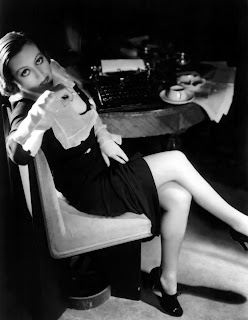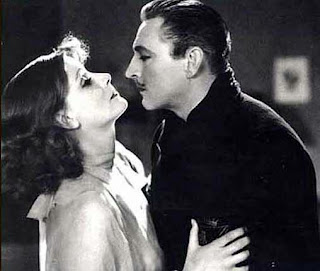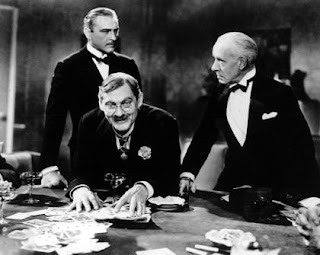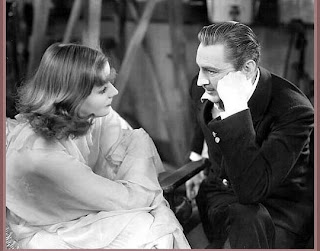"Dignity, greatness, and peace."-- Robert Marryot in his New Year's toast to the future at the end of the film, Cavalcade
This film was almost impossible to find. Which is sad because it is actually a fairly decent film. What makes one decide which films are worth preserving and which should stay lost? I can't imagine why an Academy Award winning film like this is in serious jeopardy of being forgotten. Maybe, as Americans, we can't find the desire to save something that is so quintessentially British. But this film has so much to offer, and while it sometimes suffers from being pompous and overly long, it has much more right to be preserved than, say,
The Broadway Melody.
The Plot
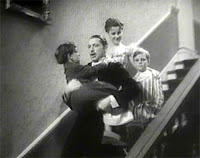 |
| Jane and Robert with their children |
The film opens on the Marryots, a well-to-do British family about to celebrate the new century, 1900. Jane and Robert Marryot, played by
Diana Wynyard and
Clive Brook, gather their two sons, Joey and Edward, and toast with their servants, parlor maid Ellen Bridges, played by
Una O'Conner, and the butler, Albert Bridges, played by
Herbert Mundin. Shortly thereafter, both Albert and Robert go off to fight the bloody Boer War in Africa. Jane is distraught, hardly comforted by her friend, Margaret, and Margaret's young daughter, Edith. When they both return, whole and safe, Jane collapses in his arms. Albert tells his wife that he has bought a pub with Robert's help, and they will now go live there and run it. Ellen is skeptical, liking her job "in service." Queen Victoria dies and everyone watches the end of an era.
 |
| Albert, Jane, Robert, and Ellen |
It is 1907. Albert has devolved into a drunken bar owner, and Ellen despairs of him. She has tea with Jane, where their 8-year-old daughter, Fanny, shows her skills as a dancer. Just as Jane and a grown up Edward (he appears about 18), are to leave, Albert arrives on the scene, drunk and irrational. He smashes the new doll Jane gave Fanny, and then chases her as she runs into the street. Albert is hit by an carriage and killed instantly.
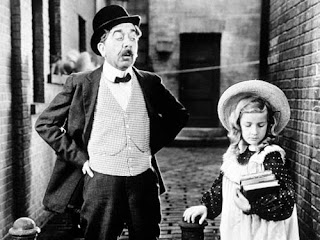 |
| Albert and Fanny |
A few years later, Jane meets Ellen again as both families walk along the boardwalk in Brighton. Ellen shows off the prize Fanny has just won for dancing, and says she is finally profiting from the pub without her husband. Edith and Edward go off on their own to the beach and profess their love for one another. Edith stares dreamily off into the water, claiming that she has always longed to go on a ship.
 |
| Edith and Edward |
In April of 1912 they are finally married and aboard a ship for their honeymoon. Edith claims that they are perfect in that moment, but she wonders if anyone can stay happily married, especially with the world changing so quickly. She loves Edward now, but doesn't know if it will last. But this, she decides as she kisses him, is their perfect moment that will last forever. They walk inside from the deck of the ship revealing the ship's name on a life preserver:
Titanic.
A few years later the family is celebrating the New Year again. Edward and Edith have drowned, and the rest of the family are on the brink of World War I. Joey, who has been something of a careless boy living only for pleasure, tells his father that he would like to join the military and fight in the war. His father, though retired, plans to join up again as well. Before Joey is shipped out, he and his friends enjoy a drink at a club. Soon a beautiful blonde comes out to perform her dance number. Joey discovers she is Fanny Bridges, and hides in her dressing room, surprising her when she returns. He tells her he thinks she is beautiful, and the two fall in love.
Over the war Joey writes to Fanny, and visits her as often as he can. Fanny has become a celebrated singer, dancer, and actress, while Joey has won accolades at war. Though neither have informed their families, they both confess their love for one another, and Joey proposes. Fanny is troubled by the difference in their stations and doesn't immediately accept him. They both plan to discuss the matter after the war is over. Joey then visits his beloved mother, who is one again upset by the pointless of war. He visits his father back at the front, who is one of the commanders. His father informs him the war is months from an armistice.
 |
| Fanny and Joey |
The armistice is to be declared any day, and Jane waits hopefully for news. Her now wealthy in her own right, Ellen visits Jane at her home. While Jane greets her with joy, Ellen treats her stiffly. She tells Jane that she has discovered a letter from Joey to Fanny, and reveals their relationship. Jane is obviously distressed when Ellen suggests they marry, but refuses to comment on her son's life. They begin to argue, when a message arrives declaring Joey dead. Jane faints dead away as Ellen drops her act of superiority and cares for her.
It is New Year's eve, 1932, and Margaret, Jane, and Robert have all grown old. Margaret leaves for a date with one of her many beaus, and Jane and Robert toast the New Year, now a family tradition. They toast to England and hope for peace. Though they have lost so much to England, they have found solace in each other and their love for their country. The film ends with a montage of different scenes from the film overlaid with Fanny singing and a field full of crosses.
The History
In 1933, Hollywood was having a difficult time. The studios had been barely scraping by since the depression, and FDR's bank holiday on March 5th caused even further damage to the largely credit dependent studios. The labor negotiating department of the Academy formed an Emergency Committee, which then recommended a 50% pay cut for all studio employees for two months. While this might have worked for Mr. Mayer, the lowly technicians would have had difficulty getting by. They changed to a sliding pay scale, but even this wasn't good enough for those touchy writers. They left the Academy and formed the Screen Writers Guild in April of 1933. When studio heads refused to restore full salaries after two months, several members resigned, including the current president. By October, the Academy had introduced its new regulatory code, which put a ceiling on the salaries of writers, actors, and directors, but not on those of studio executives. They also declared that talent agents had to be licensed by the producers they worked with, and that artists could not accept bids from other studios when their contracts were up for renewal until their current studio had decided to pass. Thus the Screen Actors Guild was born and actors began leaving the Academy in droves.
Despite all the controversy, the 6th Academy Awards were as highly attended as ever. A decision to have the awards given out by calendar year pushed the ceremony back some, and the ceremony was moved from November to March of 1934. In a last ditch PR effort, the Academy made the event as fun as possible, encouraging people to dance to Louis Armstrong and his band before settling down to dinner and the awards. This was also the year that the statuette got its name. According to legend, Academy librarian Margaret Herrick said upon seeing the statue, "It looks like Uncle Oscar!" The nickname became a derogatory word for the award until Walt Disney, winning his second consecutive award for "Best Cartoon," respectfully referred to the award as an "Oscar." The nickname took on an entirely new connotation that is still used today.
Cavalcade was originally a play written by
Sir Noel Coward who then sold the movie rights to Fox for $100,000. Veteran Hollywood director
Frank Lloyd dove right into the sweeping British epic and
Cavalcade was a hit with the critics, although not as much with the box office; people far preferred such apple pie American fare as
State Fair. Nevertheless
Cavalcade was nominated for "Best Art Direction," "Best Picture," "Best Director," and "Best Actress," only losing the last category to
Katherine Hepburn's performance in
Morning Glory
. Diana Wynyard would later be have her footprints at Grauman's Chinese Theater in Los Angeles, in honor of her role. When the Awards host, comedian
Will Rogers, announced that the winner of the "Best Director" award went to his friend, Frank, director
Frank Capra jumped out of his seat, ran to the stage and waved to the spotlight, shouting "Over here!" He was left to slink back to his table when the spotlight actually stopped on Frank Lloyd, later calling the moment "the longest, saddest, most shattering walk in my life. All my friends at my table were crying."
Cavalcade is largely lost to audiences today, dude to its limited availability. It is remembered as a rousing, emotionally patriotic film that sometimes dips into excessive melodrama. So few have actually seen the film that it is distinguished as having the least number of votes of any Academy Award winning film on
IMDb.
The Verdict?
When I began this project, I made sure that every film was available for viewing in some form. For both
Wings and
Cavalcade, I discovered that I was able to watch both on
YouTube in 10 minute increments. Obviously this wasn't ideal, but I thought it added some funny ridiculousness to the project.
Wings was uploaded by several different people with good quality. For
Cavalcade, I found only one. A Portuguese person by the username of "pacocasacarra" had uploaded the entire film. Not only did it have Portuguese subtitles, but each clip simply had the title of
Cavalcade, so I had to guess which clip came after another. I sighed, decided this was part of the adventure, and bookmarked the page. This past weekend I settled down to make sure I could watch the film, and discovered to my horror that "pacocasacarra" had been banned from
YouTube, presumably because he/she was uploading copyrighted material. Now I was really starting to freak.
Cavalcade is only available on DVD in a Korean version, of all things. I could buy it used as a VHS on
Amazon, but I would have to wait a week to ship and then somehow figure out a way to find a VHS player (not as easy as it would have been 10 years ago). I frantically googled, hoping someone had uploaded the movie on some of the less reputable video sites. Nothing. I was just about to give up hope when I decided to check a torrent site. I never expected that among all the pirated programs and movies there would be someone who would upload a pirated, torrent version of
Cavalcade. But someone did. One person. I personally think it is "pacocasacarra," as I still had to endure the Portuguese subtitles. I like to think of him as a knight of lost cinema, a renegade film pirate with a mustache who serfs the web and uploads impossible-to-find old movies. But I digress...
 |
| VHS cover of Cavalcade (Robert and Jane) |
I enjoyed
Cavalcade. It parades the Marryot family through the most important British events from 1900-1933, and pits them against a rapidly changing world.
Cavalcade endeavors to show the clash between the Victorian attitude of Jane and Robert and the more modern sensibilities of both their children and, to a certain extent, Ellen. Jane and Robert seem confused by the changes that effect them, but manage to stay cocooned in their bubble of upper class respectability. And while Edward seems to take for granted the happiness of his future married life, Edith is much less sure. She questions whether love can last in a marriage, a question that would not have been a consideration for her parents generation. The egocentric reflection of the kind that Edith embarks on is a far more 21st century conversion, so much so that Edward cannot seem to come to grips with it. Then there is Ellen, who at first is the parody of a dutiful cockney servant, directly apposed to change. By the end of the film, her daughter is an actress, hobnobbing with the rich while dating her mother's former employer's son. Ellen herself, all dressed in furs, approaches Jane as an equal to propose the marriage of their children. It is unclear, however, how much we are meant to sympathize with this new world. Every person who conforms to the new century dies or comes to a bad end. In the end, we are left with only Jane and Robert, in their same house, following their same rituals. All who have followed the future are gone. And of course, though no one knew it, a new war was about to follow this one. A war that would be much worse than the last.
Though it sometimes seems like a history lecture, and can be heavy handed when assigning the moral of the film,
Cavalcade is not a film to be thrown aside. It raises important questions, and I hope that it isn't lost forever. I told a friend tonight that I didn't mind revealing the end of the film, because I knew she would never see it, even if she wanted to. It's so sad to me that that's true.





























